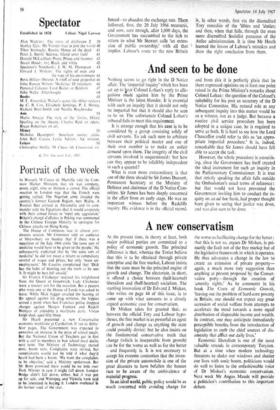And seen to be done
Nothing seems to go right in the D Notice affair. The 'impartial inquiry' which has been set up to gear Colonel Lohan's reply to alle- gations made against him by the Prime Minister is the latest blunder. It is essential with such an inquiry that it should not only be impartial but that it should also be seen to be so. The unfortunate Colonel Lohan's tribunal fails to meet this requirement.
It is strange enough that his case is to be considered by a group consisting solely of civil servants. To ask such men to arbitrate between their political master and one of their own number is to make an unfair demand upon them. The integrity of the civil servants involved is unquestioned: but how can they appear to be infallibly independent in such a quarrel?
What is even more extraordinary is that one of the three should be Sir James Dunnett, Permanent Secretary at the Ministry of Defence and chairman of the D Notice Com- mittee. Sir James has been deeply concerned in the affair from an early stage. He was an important witness before the Radcliffe inquiry. His evidence is in the official record, and from this it is perfectly plain that he there expressed opinions on at least one point raised in the Prime Minister's remarks about Colonel Lohan: the question of the Colonel's suitability for his post as secretary of the D Notice Committee. His natural role at any subsequent inquiry into this matter would be as a witness, not as a judge. But because a routine civil service procedure has been adopted in a unique case, he is required to serve as both. It is hard to see how the Lord Chancellor could refer to this as 'an appro- priate impartial procedure.' It is, indeed, remarkable that Sir James should have felt able to accept the task.
However, the whole procedure is astonish- ing, since the Government has itself created the ideal instrument for such an inquiry in the Parliamentary Commissioner. It is true that strictly speaking the affair falls outside the Ombudsman's usual terms of reference: but that would not have prevented the Government inviting him to conduct the in- quiry on an ad hoc basis, had proper thought been given to seeing that justice was done, and was also seen to be done.






























 Previous page
Previous page